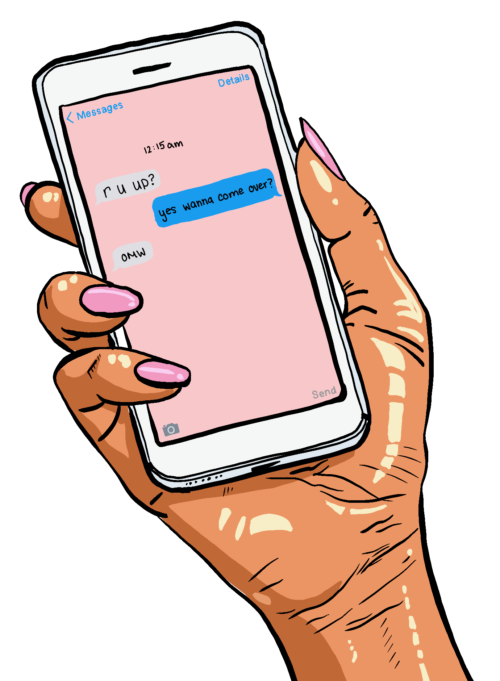It’s 11 p.m. on a Thursday and your hookup buddy is on their way to your dorm. You’ve showered, cleaned your room (stuffed all the clutter in the closet), filled in your roommates, made sure the lighting is absolutely perfect, and put on an effortless outfit. After all, this is a random, meaningless hookup—you’ve both established that you’re not looking for a relationship right now. Just fun, nothing more. It’s not like you’re actually invested in this…right?
Even through the cuddling afterward, doing the mental math of how many hours it’s been since they texted you back, and stalking every form of social media each ex of theirs has posted on since the age of 12, it’s still casual. If they get with someone else, so what?, you tell yourself. Just don’t let me see it. Or hear about it. Or be within a five-mile radius of where it actually happens.
72% of college students report having at least one hookup in college by the end of their senior year. Everyone swears they’re not invested, and that casual hookups are just part of the college experience. And yet, many of these seemingly low-stakes connections end with never speaking again and silent resentments. The reality is, even in something as supposedly carefree as a casual hookup, emotions have a way of sneaking in, adding unplanned complications. While these casual connections are generally supposed to be no strings attached, as it turns out the “stringless” part is much easier said than done. For all the talk about staying “unattached,” it’s surprising how often the strings of these encounters leave us tangled up in expectations we never meant to have.
How do these seemingly carefree hookups get so complicated? Maybe it’s because any connection, even a casual one, is driven by deeper psychological and physiological needs that can’t just be “turned off.” Our brains respond to physical intimacy by releasing chemicals like oxytocin, which can promote bonding and trust in nature. We might try to compartmentalize, but when our brains are literally wired to connect to keep us safe, it’s hard to keep emotions out completely. So while you can tell yourself it’s just a hookup, your body says differently.
There’s also the emotional aspect of craving validation, something casual hookups do offer in the short term. For some, these hookups feel like low-stakes fun, but for many, they become an ongoing measuring stick of desirability. Sometimes, you’re hoping they’ll text you back quickly—not just because it’s polite, but because it’s a sign that they value you. It’s this contradiction that complicates things—even though we’re looking for something “no pressure,” our bodies and minds crave consistency and validation that these situations aren’t set up to provide.
Where’s the line between fun and over-investment? How much is too much to put into this hookup? Let’s start with the time factor. You’re planning your schedule around their texts, pretending you just happened to be free when they ask to hang out, and setting aside nights “just in case.” Casual is supposed to be about spontaneity, but here you are mentally reserving weekends, coordinating with roommates to ensure privacy, and putting more thought into this than your Justice paper (which you haven’t started). If “keeping it casual” is now something you’re pre-planning, maybe it’s already bordering on too much.
Let’s revisit the emotional investment. Casually waiting for a text back becomes subtly intertwined with actual nerves, replaying every response to make sure it sounds chill. The game of not caring suddenly becomes the most stressful part of your week, and detachment starts feeling like a job. The more energy you put into analyzing each interaction, the more the attachment inevitably sneaks in.
Outside of the time commitment and emotional toll, there is also the mental space it may take up. Even if you’re not actively planning your day around them and are feeling reasonably confident in your texting game, how much of your mind do they occupy? Casual is supposed to mean that outside of seeing each other, they’re not taking up too much of your thoughts. If you’re replaying conversations in your head or stressing about when they’ll text you back, they’ve moved from “casual” to “constant background noise.” It’s one thing to occasionally think about them—it’s another if they’re becoming a central character in your life.
At the end of the day, maybe casual doesn’t have to mean unaffected; maybe it’s about staying honest with ourselves about what we want or need out of any given connection. When we’re able to see hookups as meaningful in their own right rather than forcing them into a “chill” category, we can live in the moment and experience the fun and natural feelings that come with human connection.
“There’s something to be said about sharing experiences with people—simply meeting people and sharing a moment with them. Some people take up more pages in our life story than others, but not everyone needs a full chapter. Sometimes a paragraph, however shortly lived, can still be a meaningful moment of our stories,” an anonymous Harvard sophomore male said. The point isn’t to shut out our emotions but to engage with them in a way that doesn’t demand more from the moment than it’s able to give at that time. Sometimes the real “casual” or “chill” approach is embracing the experience and all that comes with it, without the expectation of it being more or less than what it is.
The current significant other of this article’s author was once a casual hookup.

